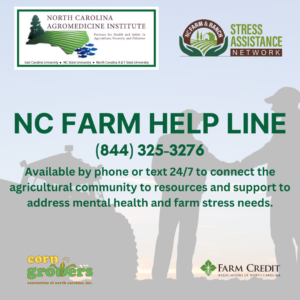Farmer and Rural Mental Health Resources
go.ncsu.edu/readext?1031483
en Español / em Português
El inglés es el idioma de control de esta página. En la medida en que haya algún conflicto entre la traducción al inglés y la traducción, el inglés prevalece.
Al hacer clic en el enlace de traducción se activa un servicio de traducción gratuito para convertir la página al español. Al igual que con cualquier traducción por Internet, la conversión no es sensible al contexto y puede que no traduzca el texto en su significado original. NC State Extension no garantiza la exactitud del texto traducido. Por favor, tenga en cuenta que algunas aplicaciones y/o servicios pueden no funcionar como se espera cuando se traducen.
Português
Inglês é o idioma de controle desta página. Na medida que haja algum conflito entre o texto original em Inglês e a tradução, o Inglês prevalece.
Ao clicar no link de tradução, um serviço gratuito de tradução será ativado para converter a página para o Português. Como em qualquer tradução pela internet, a conversão não é sensivel ao contexto e pode não ocorrer a tradução para o significado orginal. O serviço de Extensão da Carolina do Norte (NC State Extension) não garante a exatidão do texto traduzido. Por favor, observe que algumas funções ou serviços podem não funcionar como esperado após a tradução.
English
English is the controlling language of this page. To the extent there is any conflict between the English text and the translation, English controls.
Clicking on the translation link activates a free translation service to convert the page to Spanish. As with any Internet translation, the conversion is not context-sensitive and may not translate the text to its original meaning. NC State Extension does not guarantee the accuracy of the translated text. Please note that some applications and/or services may not function as expected when translated.
Collapse ▲In the aftermath of Hurricane Helene, which wrought devastation across Western North Carolina already estimated in the tens of billions of dollars, farmers in the region are left picking up the pieces — physically and psychologically.
Already one of the most dangerous and emotionally-taxing professions, agriculture can be a feast-or-famine endeavor in more ways than one. During times of natural disaster, for example, farmers are faced not only with the loss of property and possessions, but family legacies and livelihoods.

Farmers dealing with mental health and farm stress issues should call the North Carolina Farm Help Line at 1-844-325-3276.
But they are not alone. Help and resources are available to see them through the tough times.
The North Carolina Farm and Ranch Stress Assistance Network (FRSAN), an initiative of the N.C. Agromedicine Institute coordinated by East Carolina, N.C. A&T State and NC State universities, provides farmers and others working in agriculture-related settings a variety of stress assistance resources and programs.
One such resource is the North Carolina Farm Help Line. Available 24/7, the help line connects farmers, farmworkers and their families with mental health support, as well as financial, legal and other assistance as needed.
1-844-325-3276
Call or Text | Available 24/7
Callers are matched with a specially-trained farmer or rancher who personally understands the unique stresses associated with agriculture and farming. They can help those in need work through their mental health challenges while guiding them to the resources best suited to their needs.
Find additional information in FRSAN’s N.C. Farm Stress Resource Directory.
MORE RURAL MENTAL HEALTH RESOURCES
Find additional resources from Rural Mental Health Resilience, a program of Rural Minds and the National Grange that provides mental health information, resources and training for people who live in rural communities across the country.
- How to Start the Conversation About Mental Health
- Five Common Myths About Rural Mental Health
- Suicide Prevention Brochure
If you or someone you know is experiencing suicidal thoughts, please reach out immediately to the 988 Suicide and Crisis Lifeline by dialing or texting 988.


